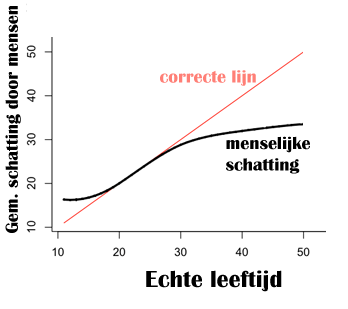Writing about her new study on Twitter and age, researcher Dong Nguyen starts off with a little quiz. How old do you think the people are who sent these respective tweets?
AS LONG AS YOU LOVE ME <3
Interesting article about usability design on mobile search [LINK]
That might seem like a test for advanced Twitterati, but in a paper published this month—titled “‘How Old Do You Think I Am?’: A Study of Language and Age in Twitter”—four Dutch researchers reveal stylistic tics associated with younger and older tweeters. Nguyen’s team also discovered that, based on such tweet-tics, an automated program can better predict your age than a fellow human can.
Linguists love Twitter because it gives them access to an enormous amount of fresh data about how people communicate, and academics have used tweets to study how language might betray your ethnicity, gender and geographical location. (Coca-Cola is “pop” in some places, after all, and “soda” in others.) For their study on age, Nguyen and her colleagues randomly selected Twitter accounts and did some online sleuthing to determine the age of the owners, the best they could, using publicly available information like a LinkedIn profile stating that the person graduated from high school in 2002.
Younger tweeters, the University of Twente doctoral student found, were more likely to talk about themselves, use text speak, use ALL CAPITALIZED words and employ alphabetical lengthening, like writing “niiiiiiice” instead of “nice.” Among the top features associated with young people were the word school—which makes sense given that they’re more likely to be in it—the pronoun I, the articulated laughter haha and the classic happy face “:)”.
Older tweeters, meanwhile, were more likely to tweet out well-wishing phrases like good morning and take care. And their style is the kind we’d associate with better education: They used more complex language, longer tweets, longer words and more prepositions like for, to and under. The elder crowd also has a higher usage of links and hashtags. Nguyen theorizes that this is related to a stronger desire to share information and “impression management.”
Though an automated system analyzing word use did a better job picking out the age of tweeters, Nguyen found that it was much harder for both automatons and humans to predict the age of older users. The variables they studied show little change after about 30 years of age, Nguyen tells TIME: “For example, the difference between the language of a 13-year-old and a 18-year-old is much larger (on average) than the difference between the language of a 40- or 50-year-old.”
This graph, written in Dutch, shows where humans start to miss the mark. The red line represents perfect age predictions for Twitter users and the black line shows what people guessed. As you can see, the tendency is to underestimate the age of the tweeter:
Even if younger people are easier to pick out, as Nguyen writes, “Not every X-year old sounds the same.” In one case study, Nguyen’s system pegged a 24-year-old as a 17-year-old because the tweeter used teeny-bopper style, frequently referencing themself and throwing punctuation into unconventional places.
Still, by now you should be able to guess which tweet at the top is from the more youthful social-media user. As Nguyen reveals at the end of her post:
AS LONG AS YOU LOVE ME <3 is the product of a 13-year-old female.
Interesting article about usability design on mobile search [LINK] comes from a 30-year-old male.
———–
This is an edition of Wednesday Words, NewsFeed’s weekly feature on language. For the previous post, click here.







